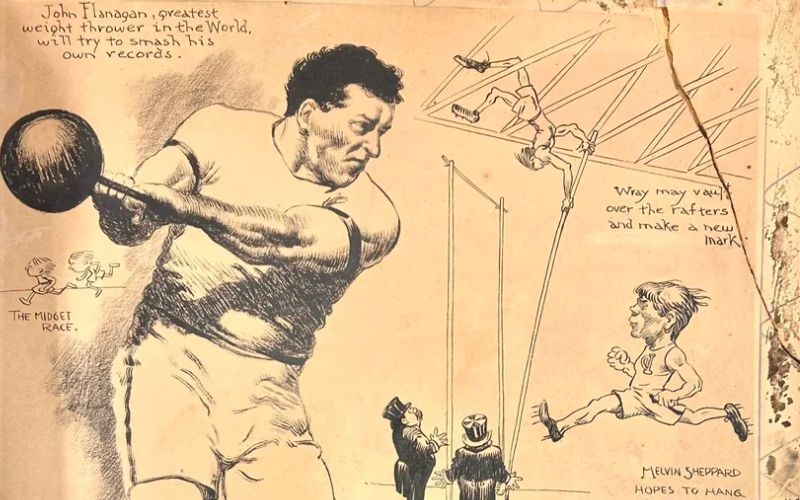It is not just in the west where there are good pubs and good craic and good yarns.
On the last Saturday of March our clocks went formally forward into summer time by one hour. The weather was brilliant, and son Dara and myself hit the road for Wexford at noon.
The reason for the trip was that my lovely musician brother Cathal was getting a major award for his music at a ceremony in the Wexford Opera House that evening. It was the perfect excuse for father and son to absent themselves for a night from two wives who are both studying furiously at the moment for higher academic honors.
So we hit the road south with their blessings, and that is how we met Wallie from Wexford who was once a rag and bone merchant in central London and was barred from Buckingham Palace by Her Majesty Herself!
Before that, though, we traveled through Waterford -- where we both worked in different eras -- and we passed the replica Famine ship the Dunbrody at the pier in picturesque New Ross, and the sun never stopped shining on the long lushlands of the sunny south east.
Then into the home parishes of the fabled pikemen of Wexford and finally into Wexford town. I have not been there for more than 20 years. I'd forgotten how beautiful and medieval it is.
The slanting sun bathed its old town walls, leaked in slivers into its narrow alleys. You expect to meet Redcoats clattering down even today.
We had hours to kill before the Opera House concert. We decided to have a couple of leisurely pints before adjourning to a good restaurant for a pre-theater dinner.
We walked the length of the narrow vibrant center, enjoying the twing-tangery of that unique Wexford accent which owes much to Wales across the water. We also kept our eyes open for a good pub and a good restaurant.
We spotted a good small Italian restaurant and, a hundred yards away, on the Peter Street corner, a pub that looked like the real McCoy. It was old, it was small, it had those strange pieces of old pottery in the window, and two men we saw coming out of it as we passed looked like solid countrymen who were the salt of the earth.
It was Heffernan's Pub which we discovered later was one of the oldest family pubs in Wexford. We went inside and the first thing I saw was a hearth fire, and that is a great testimonial in itself.
Dara always travels with his bouzouki on his back in case he runs into a session. There were six or seven people inside and that good wholesome "feel" that is getting harder to find.
We were hardly past the first sip of our fireside pints before Dara had been asked for a song, and the conversation was well started around the fire and along the bar.
And the leader of the craic was local man Wallie, now in his late sixties, back in his hometown from England.
He said that as a child he had sold newspapers outside the pub door. They cost a halfpenny back then, he said, and sometimes, if you said you had no change, the customer paid a penny. That was on a good day.
So Dara sang a song that Mickie wrote called "The Man That Drank the Farm," and the atmosphere was as if we were regulars. One man at the bar said his mother was from Roscommon and we talked about Roscommon. And then about many other odds and ends.
And it was during that leisurely time that Wallie told me how he ran foul of the Queen of England during the years he was a rag and bone merchant in central London about 40 years ago.
I never met a rag and bone merchant before in my life. It was an urban thing -- they had them in Dublin and Cork too, I think.
But Wallie was at the heart of it. He had to have a horse and cart. He had to wear a long black coat and equip himself with a brass bell as he drove through the narrow side streets of London shouting out the traditional ragman's clarion cant.
I wrote some of it down. It was that interesting.
It went, "Old Pots, New Pots, Jam Pots, Pisspots! New Rags, Old Rags, Toe Rags, Coal Rags! Don't come out tomorrow for the dog pissed on the STRAWBERRIES!!!"
You had to say the last word very loudly and theatrically as you rang your brass bell in pursuit of trade.
You see, Wallie had a white pony at the time. The white pony looked fine and dandy and made a great show on flat streets and alleys.
But he was broken-winded and not able for hills at all. He would start wheezing after a couple of uphill yards.
So cute Wallie, to avoid steep hills on his route around Piccadilly, discovered that he could take a flat shortcut through the grounds of Buckingham Palace. He could not ring his bell there, but the white pony could travel well. He did it often.
And then came the unlucky day when they were burling along merrily through the grounds of Buckingham Palace, and who did they not meet but Her Majesty her own self in her state coach drawn by four or six gleaming steeds, surrounded by horse guards, heading off for some big state occasion.
And Herself looked out haughtily enough at Wexford Wallie, the ragman heading in the other direction with his black coat and broken-winded white pony. And that was the end of the shortcut.
The next week when Wallie attempted to enter the grounds there were about a dozen big bobbies waiting for himself and the poor pony, clearly on Her Majesty's instructions, and he was never allowed in again. Barred by the Queen of England!
We had a mighty night afterwards at the Opera House. Cathal got his big award and, to our mind, stole the show with his ballad singing. The entire Boys of the Lough turned up for the night, and all the luminaries were there.
It was great stuff, and the Irish language station TG4, which recorded the entire concert, threw a party afterwards in White's Hotel, and that party developed into a session.
My bold Dara got to join in playing music with the best of the best until the small hours of the morning, and that was how my summer and his got started off on the right foot. It was a night and morning to remember for a long time.
And I enjoyed Wallie's story in Heffernan’s great old pub as much as I enjoyed anything else.
On the last Saturday of March our clocks went formally forward into summer time by one hour. The weather was brilliant, and son Dara and myself hit the road for Wexford at noon.
The reason for the trip was that my lovely musician brother Cathal was getting a major award for his music at a ceremony in the Wexford Opera House that evening. It was the perfect excuse for father and son to absent themselves for a night from two wives who are both studying furiously at the moment for higher academic honors.
So we hit the road south with their blessings, and that is how we met Wallie from Wexford who was once a rag and bone merchant in central London and was barred from Buckingham Palace by Her Majesty Herself!
Before that, though, we traveled through Waterford -- where we both worked in different eras -- and we passed the replica Famine ship the Dunbrody at the pier in picturesque New Ross, and the sun never stopped shining on the long lushlands of the sunny south east.
Then into the home parishes of the fabled pikemen of Wexford and finally into Wexford town. I have not been there for more than 20 years. I'd forgotten how beautiful and medieval it is.
The slanting sun bathed its old town walls, leaked in slivers into its narrow alleys. You expect to meet Redcoats clattering down even today.
We had hours to kill before the Opera House concert. We decided to have a couple of leisurely pints before adjourning to a good restaurant for a pre-theater dinner.
We walked the length of the narrow vibrant center, enjoying the twing-tangery of that unique Wexford accent which owes much to Wales across the water. We also kept our eyes open for a good pub and a good restaurant.
We spotted a good small Italian restaurant and, a hundred yards away, on the Peter Street corner, a pub that looked like the real McCoy. It was old, it was small, it had those strange pieces of old pottery in the window, and two men we saw coming out of it as we passed looked like solid countrymen who were the salt of the earth.
It was Heffernan's Pub which we discovered later was one of the oldest family pubs in Wexford. We went inside and the first thing I saw was a hearth fire, and that is a great testimonial in itself.
Dara always travels with his bouzouki on his back in case he runs into a session. There were six or seven people inside and that good wholesome "feel" that is getting harder to find.
We were hardly past the first sip of our fireside pints before Dara had been asked for a song, and the conversation was well started around the fire and along the bar.
And the leader of the craic was local man Wallie, now in his late sixties, back in his hometown from England.
He said that as a child he had sold newspapers outside the pub door. They cost a halfpenny back then, he said, and sometimes, if you said you had no change, the customer paid a penny. That was on a good day.
So Dara sang a song that Mickie wrote called "The Man That Drank the Farm," and the atmosphere was as if we were regulars. One man at the bar said his mother was from Roscommon and we talked about Roscommon. And then about many other odds and ends.
And it was during that leisurely time that Wallie told me how he ran foul of the Queen of England during the years he was a rag and bone merchant in central London about 40 years ago.
I never met a rag and bone merchant before in my life. It was an urban thing -- they had them in Dublin and Cork too, I think.
But Wallie was at the heart of it. He had to have a horse and cart. He had to wear a long black coat and equip himself with a brass bell as he drove through the narrow side streets of London shouting out the traditional ragman's clarion cant.
I wrote some of it down. It was that interesting.
It went, "Old Pots, New Pots, Jam Pots, Pisspots! New Rags, Old Rags, Toe Rags, Coal Rags! Don't come out tomorrow for the dog pissed on the STRAWBERRIES!!!"
You had to say the last word very loudly and theatrically as you rang your brass bell in pursuit of trade.
You see, Wallie had a white pony at the time. The white pony looked fine and dandy and made a great show on flat streets and alleys.
But he was broken-winded and not able for hills at all. He would start wheezing after a couple of uphill yards.
So cute Wallie, to avoid steep hills on his route around Piccadilly, discovered that he could take a flat shortcut through the grounds of Buckingham Palace. He could not ring his bell there, but the white pony could travel well. He did it often.
And then came the unlucky day when they were burling along merrily through the grounds of Buckingham Palace, and who did they not meet but Her Majesty her own self in her state coach drawn by four or six gleaming steeds, surrounded by horse guards, heading off for some big state occasion.
And Herself looked out haughtily enough at Wexford Wallie, the ragman heading in the other direction with his black coat and broken-winded white pony. And that was the end of the shortcut.
The next week when Wallie attempted to enter the grounds there were about a dozen big bobbies waiting for himself and the poor pony, clearly on Her Majesty's instructions, and he was never allowed in again. Barred by the Queen of England!
We had a mighty night afterwards at the Opera House. Cathal got his big award and, to our mind, stole the show with his ballad singing. The entire Boys of the Lough turned up for the night, and all the luminaries were there.
It was great stuff, and the Irish language station TG4, which recorded the entire concert, threw a party afterwards in White's Hotel, and that party developed into a session.
My bold Dara got to join in playing music with the best of the best until the small hours of the morning, and that was how my summer and his got started off on the right foot. It was a night and morning to remember for a long time.
And I enjoyed Wallie's story in Heffernan’s great old pub as much as I enjoyed anything else.




Comments